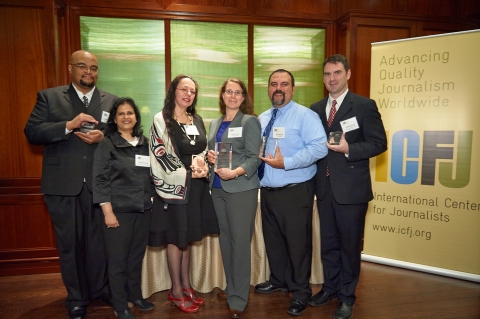
Five reporters, in an ICFJ program on how to use and analyze data in business stories, were honored at a dinner at McGraw Hill Financial's midtown headquarters.
The Keystone XL pipeline, which would bring crude oil from Canada to the Gulf, has been hotly debated for environmental and economic reasons. But the social cost on Native American communities has been overlooked—until now.
Reporter Mary Annette Pember’s story, “Will Keystone XL Pipeline Pump Sexual Violence Into South Dakota?” is just one of hundreds by journalists in an International Center for Journalists program that aims to bring coverage of important financial topics to minority communities. Over the past 5 years, ICFJ has worked with more than 250 journalists in this distinguished initiative, sponsored by McGraw Hill Financial.
“Until this program came along, journalists in small cities and towns serving large minority communities rarely had a chance to learn how to report on financial issues,” said ICFJ President Joyce Barnathan. “Now they can delve into business journalism and their audiences greatly benefit from the information.”
This year’s program focused on teaching reporters to find, analyze and visualize data. It began with an eight-week online course in data journalism taught in both English and Spanish. That was followed by an eight-week online mentoring period, during which participants produced stories under the guidance of seasoned professionals, including several from program partner MarketWatch.
Five reporters who produced the most outstanding work went to New York to meet with leading businesses and financial journalism outlets, including Standard & Poor’s, Barron’s and Bloomberg News. They were also honored at a dinner at McGraw Hill Financial’s headquarters in midtown New York.
The winners were:
Reporter Steph Guinan won first place for shedding light on the hidden face of American poverty. In her piece “The Poverty Problem in the Rural Mountain Communities of Western North Carolina,” she used an array of maps, charts and graphs to paint a stark picture of isolated mountain towns. The two-part series will be published in the Carolina Public Press this month.
Second-place winner Gene Siudut unveiled a new trend in Florida, whose gated suburban communities have traditionally been a haven for retirees. In his story “Baby Boomers Invading Tampa,” he analyzed population data to discover that the next generation of retirees is choosing to spend their golden years in the city rather than the suburbs. The boomers liked the benefits of urban living, such as walkability and cultural attractions, not to mention that the cost of living in Tampa is 7 percent below the national average.
Mary Annette Pember received third place for her investigation of South Dakota’s staggering rates of sex trafficking and rape of Native American women, who are abused by restless yet transient male laborers working for the state’s major industries. Her piece, “Will Keystone XL Pipeline Pump Sexual Violence Into South Dakota” questioned whether this new development would exacerbate the problem. Her story ran in the online news portal Indian Country Today. It has been widely distributed on Native American news outlets—and MSN.com published a piece on the same issue soon after hers ran.
Honorable mentions went to Robbie Scott Ward of the Northeast Mississippi Daily Journal and Frederick Reese of Mint Press News. Ward sparked a community-wide debate with his report, “West Jackson Project Seen as Crucial for Tupelo,” on the local government’s controversial plan to clean up a crime-ridden neighborhood by buying up and renovating blighted properties. Until his piece came out, officials and reporters had rarely relied on data to explain this issue.
In his story, “Minimum Wage Question May Be a Matter Of Image, Not Choice,” Reese highlighted why big-box retailers refuse to pay minimum wage. By analyzing data such as overhead, net profit and employee turnover at companies like Target and Wal-Mart, Reese shows that these companies can afford to increase salaries—but choose not to. Instead, they prefer to spend their cash on stock buyback programs that make the firms more attractive to investors.
At the awards dinner, Chuck Jaffe, senior columnist for MarketWatch, gave a keynote address on the five important data-driven stories today, which was followed by a Q&A session with ICFJ’s Barnathan.
You can listen to Jaffe's remarks, and the Q&A, below: